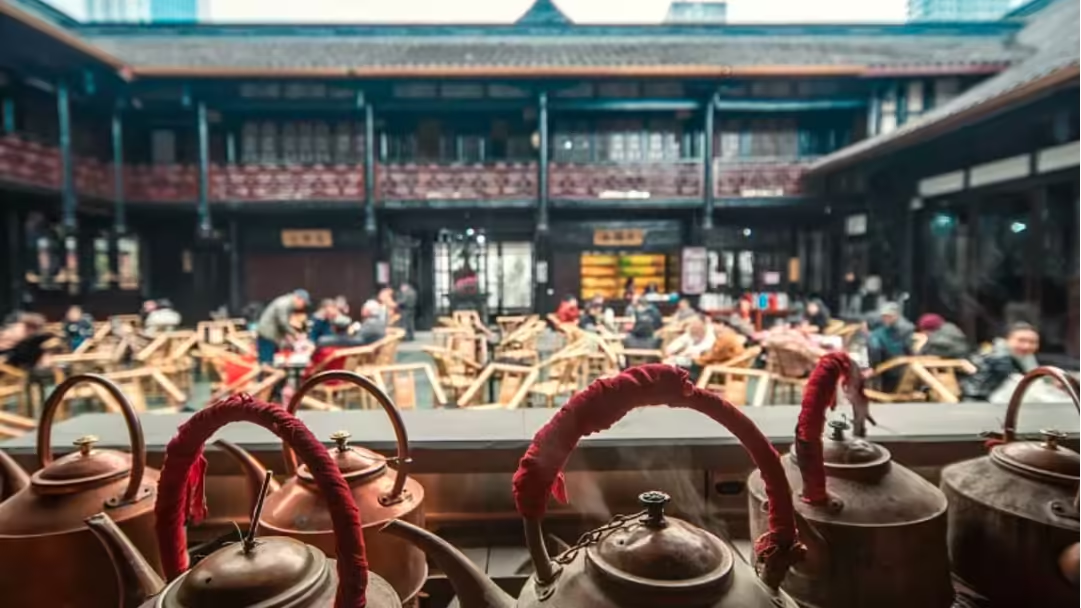Tea houses in Chengdu are more than just places to enjoy a cup of tea; they are a reflection of the city’s leisurely lifestyle and rich cultural heritage. In Chengdu, visiting a tea house is the epitome of relaxation, embodying the innate calmness and leisurely attitude of its people. It’s a tradition deeply rooted in the local culture, offering a unique way to experience the laid-back atmosphere of Sichuan.
The Ubiquitous Tea Houses of Chengdu
In Chengdu, tea houses are everywhere. Nearly every street has at least one, and regardless of the time of day, these establishments are always bustling with activity. From sunrise to sunset, you’ll find them packed with people, a testament to their popularity and the integral role they play in the daily lives of the locals.
The tea houses in Chengdu are styled with a distinct charm. Forget the formal setting of high tables and straight-backed chairs; here, it’s all about comfort. Patrons lounge lazily on low bamboo chairs, surrounded by the gleaming copper teapots and uniquely designed tea bowls. Even the waitstaff, known as “tea masters,” serve tea with an effortless grace that adds to the overall sense of relaxation.
The Essence of Tea House Culture: Socializing and Relaxation
For Chengdu locals, visiting a tea house isn’t just about drinking tea—it’s about enjoying the entire experience. Tea houses are social hubs where people gather to catch up, share stories, and unwind. One of the most important activities in a Chengdu tea house is “Bai Long Men Zhen,” or chatting. This tradition of storytelling and conversation is central to the tea house experience.
In a Chengdu tea house, conversations can range from mundane daily life to profound discussions about history and philosophy. Ordinary people might discuss current events and reminisce about the past, while intellectuals might delve into deeper topics, reflecting on the complexities of life and society. In the past, tea houses even served as informal courts where neighbors could resolve disputes, underscoring their importance as communal spaces.
Over time, regulars in these tea houses become well-acquainted with each other’s lives. If someone needs help, a simple shout is often enough to rally support. This sense of community, nurtured over cups of tea, creates strong bonds among the patrons, making the tea house a place where social connections flourish.
The Art of Tea Serving and Related Traditions
The tea house culture in Chengdu has also given rise to various related professions and traditions. For example, “tea masters” or “tea doctors” are skilled in the art of serving tea. They pour the tea with remarkable precision, ensuring that the stream of water falls gracefully into the bowl and stops perfectly, with the tea level just right—not too full to offend and not too little to seem stingy. The saying “wine to the brim honors the guest, tea to the brim insults them” reflects the delicate balance they strive to achieve.
Another popular service found in Chengdu tea houses is ear cleaning, known as “Cai Er.” This ancient practice involves using a set of specialized tools to gently clean the ears, providing a sensation of comfort and relaxation. It’s an art in itself, requiring both skill and care to ensure that the customer feels at ease without any discomfort.
Conclusion
Chengdu’s tea houses are more than just places to drink tea – they are cultural landmarks that embody the essence of Sichuan’s leisurely and communal lifestyle. Whether you’re sipping a fragrant cup of tea, engaging in lively conversation, or simply soaking in the serene atmosphere, a visit to a Chengdu tea house offers a unique and unforgettable glimpse into the soul of the city. Here, time seems to slow down, allowing you to fully appreciate the charm and richness of Sichuan culture.

